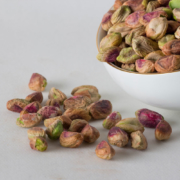Pistachios And Heart Health
Pistachios take good nutrition to heart. Evidence suggests that including pistachios as part of a well-balanced diet helps to support a healthy cardiovascular system.
In fact, a 2011 study published in the British Journal of Nutrition found that when healthy individuals included 1.5 and 3 ounces of pistachios in their typical American diet, cardio-supportive results were shown.1 Here are some additional heart-smart reasons to love pistachios:
BEST SOURCE OF PHYTOSTEROLS Pistachios offer more phytosterols than any other nut. This is important because phytosterols are similar in structure to cholesterol, and healthy phytosterols compete with unhealthy cholesterol in the diet for absorption in the body. A 30-gram serving of pistachios provides 64 milligrams of phytosterols; walnuts, 22 milligrams, roasted almonds, 38 milligrams.
GOOD SOURCE OF HEART-HEALTHY FATS Pistachios are a good source of monounsaturated and polyunsaturated fats. Of the 14 grams of fat per 30-gram serving, the majority (nearly 90 percent) is of the healthy unsaturated type. Monounsaturated fat comprises 55 percent of the fat in pistachios; 32 percent is polyunsaturated.3 And, because no oils are used during roasting, pistachios are naturally trans-fat free.
ANTIOXIDANT SUPERFOOD Pistachios are a heart throb when it comes to antioxidants, offering a higher antioxidant capacity compared to other popular snack nuts like almonds and cashews. In a 30-gram serving, pistachios have an antioxidant capacity of 2302 TE/100g compared to almonds with 1336 TE/100g and cashews, 584 TE/100g.4
Compared to other popular snack nuts, pistachios deliver the highest source of beta-carotene, lutein and zeaxanthin. In fact, in a study conducted at Pennsylvania State University, subjects with high cholesterol were assigned three different isocaloric diets consisting of 1.5 or three ounces of pistachios a day or a heart- healthy diet without pistachios. After one month, researchers noted increased levels of lutein, beta-carotene and gamma- tocopherol in the pistachio-rich diets and further showed that pistachios may provide cardiovascular health support.
“Scientific evidence suggests, but does not prove that eating 1.5 ounces per day of most nuts, such as pistachios, as part of a diet low in saturated fat and cholesterol, may reduce the risk of heart disease.




Leave a Reply
Want to join the discussion?Feel free to contribute!